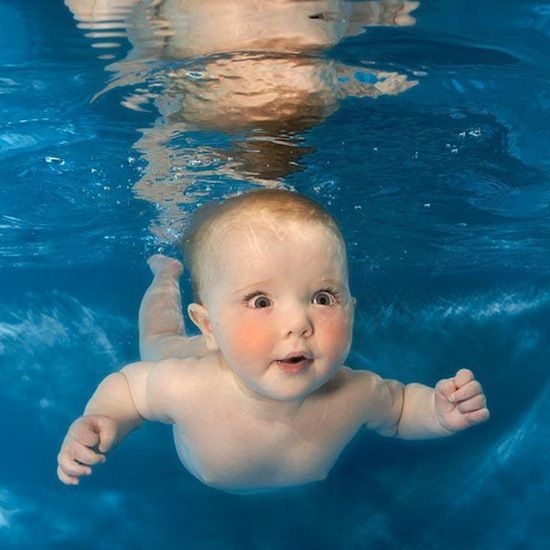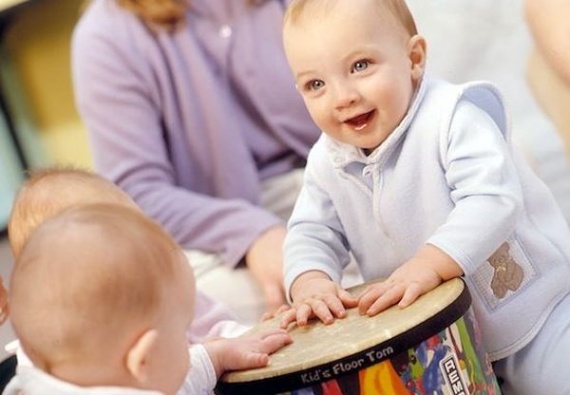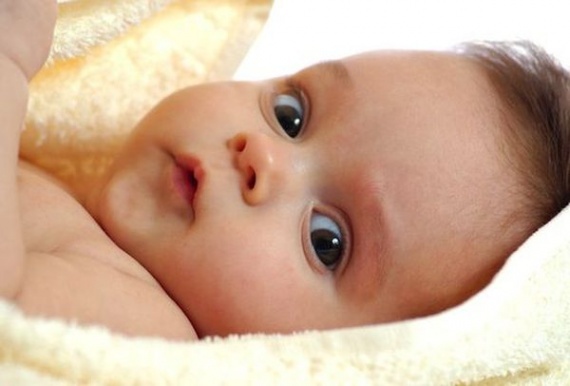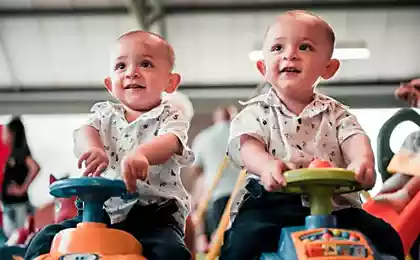1400
5 "superpowers" that have small children (5 photos)
Infants usually look completely helpless, but in fact they are capable of amazing things! We offer you a selection of "superpowers" of children under 3 years.

1. Water instinct

At birth, a person receives a set of instincts that work well as long as the brain is not developed enough to take control of survival. One of these instincts is the "diving reflex", which is also found in seals and other animals living in the water. Here's how it works: if a baby under the age of six months put it in the water, he reflexively hold your breath. At the same time the frequency of contractions of the heart muscle to slow down, helping to keep the oxygen and the blood begins to circulate mainly between the most vital organs: heart and brain. This reflex helps the baby to stay under water much longer than an adult, no serious health threats.
2. Learnability

Children are taught at amazing speeds, as each new experience they are going through, creating strong links between neurons in the brain. By the time the child is 3 years old, the amount of these bonds will be approximately 1,000 trillion, more than double the number in the adult. Since about 11 years the brain begins to get rid of extra connections, and learning ability will decline.
3. Quantum intuition

Our experience of reality perception significantly impedes understanding of the rules of quantum mechanics governing the behavior of elementary particles. For example, according to quantum mechanics, a particle such as a photon or electron is not "neither here nor there", and is present in both locations, and between them both. Figuratively speaking, it is more like a cloud than a ping-pong. On the scale of a large group of particles, this "blurring" disappears and the specific location of the object. However, it is easier to talk than to understand: an intuitive understanding of these laws were not given even to Einstein, to say nothing of an average adult. Infants are not yet accustomed to any a certain perception of reality that gives them the ability to intuitively understand quantum mechanics. At the age of 3 months in children has not formed a sense of "object permanence" that is, the realization that the object can only be in a certain place at a certain time. Game experiments (for example, the game Peekaboo) show amazing intuitive ability to assume the existence of the subject of babies in absolutely all places at the same time.
4. The sense of rhythm

All children are born with an innate sense of rhythm. This was proven in 2009, with the help of the experiment: the children of 2 and 3-day-old listening to the rhythm of a drum connected to the head of the sensor electrode. When the researchers intend stray from the rhythm, the brain of infants showed "foreseeability" strike at the moment where he should have been, despite the fact that he actually sounded. Scientists believe that the sense of rhythm helps children recognize the tone in the speech of their parents and thus to catch on, not knowing the words. Also, with the help of his children understand the difference between their mother tongue than any other.
5. Be nice

Yes, be nice and call the most positive emotions in adults - is also superpowers. Scientists believe that we would perceive children too pitiful, helpless, stupid and boring to them to love (to his mother it's probably not the case). If they were not so adorable and cute! Last year, a group of Canadian and Chinese psychologists published the results of their research, which says that we are touched more babies than the kids and more kids than grown-up children. The attractiveness of the child is reduced to the age of about 4 and a half years. The perception of us as a child "cutie" affect the structure of his face: a large head, round face, big eyes and small nose and mouth. These features give the adults a lot more emotion than the used nappies, so from a child to be nice superpowers indirectly, but still depends on its ability to vyzhivaniyu.Istochnik:

1. Water instinct

At birth, a person receives a set of instincts that work well as long as the brain is not developed enough to take control of survival. One of these instincts is the "diving reflex", which is also found in seals and other animals living in the water. Here's how it works: if a baby under the age of six months put it in the water, he reflexively hold your breath. At the same time the frequency of contractions of the heart muscle to slow down, helping to keep the oxygen and the blood begins to circulate mainly between the most vital organs: heart and brain. This reflex helps the baby to stay under water much longer than an adult, no serious health threats.
2. Learnability

Children are taught at amazing speeds, as each new experience they are going through, creating strong links between neurons in the brain. By the time the child is 3 years old, the amount of these bonds will be approximately 1,000 trillion, more than double the number in the adult. Since about 11 years the brain begins to get rid of extra connections, and learning ability will decline.
3. Quantum intuition

Our experience of reality perception significantly impedes understanding of the rules of quantum mechanics governing the behavior of elementary particles. For example, according to quantum mechanics, a particle such as a photon or electron is not "neither here nor there", and is present in both locations, and between them both. Figuratively speaking, it is more like a cloud than a ping-pong. On the scale of a large group of particles, this "blurring" disappears and the specific location of the object. However, it is easier to talk than to understand: an intuitive understanding of these laws were not given even to Einstein, to say nothing of an average adult. Infants are not yet accustomed to any a certain perception of reality that gives them the ability to intuitively understand quantum mechanics. At the age of 3 months in children has not formed a sense of "object permanence" that is, the realization that the object can only be in a certain place at a certain time. Game experiments (for example, the game Peekaboo) show amazing intuitive ability to assume the existence of the subject of babies in absolutely all places at the same time.
4. The sense of rhythm

All children are born with an innate sense of rhythm. This was proven in 2009, with the help of the experiment: the children of 2 and 3-day-old listening to the rhythm of a drum connected to the head of the sensor electrode. When the researchers intend stray from the rhythm, the brain of infants showed "foreseeability" strike at the moment where he should have been, despite the fact that he actually sounded. Scientists believe that the sense of rhythm helps children recognize the tone in the speech of their parents and thus to catch on, not knowing the words. Also, with the help of his children understand the difference between their mother tongue than any other.
5. Be nice

Yes, be nice and call the most positive emotions in adults - is also superpowers. Scientists believe that we would perceive children too pitiful, helpless, stupid and boring to them to love (to his mother it's probably not the case). If they were not so adorable and cute! Last year, a group of Canadian and Chinese psychologists published the results of their research, which says that we are touched more babies than the kids and more kids than grown-up children. The attractiveness of the child is reduced to the age of about 4 and a half years. The perception of us as a child "cutie" affect the structure of his face: a large head, round face, big eyes and small nose and mouth. These features give the adults a lot more emotion than the used nappies, so from a child to be nice superpowers indirectly, but still depends on its ability to vyzhivaniyu.Istochnik:























